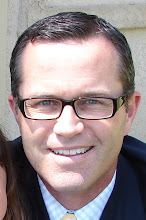
We signed my daughter up for soccer this year. She's 5 years old and she doesn't like to run. We've told ourselves, out loud and in quiet, that this is an experiment. That we have no expectations. That we want to expose her to "this kind of stuff" because it may be helpful in her physical and social development.
She has attended three practices and two games. At practice she is participating with the other girls: running, lots of running and without too much complaint. She doesn't really "get" soccer but she seems to be fitting in at practice and giving it a go. This is extremely encouraging.
As for the games, she refuses to set foot on the field once the game is underway. At the first game, in a particular touching sibling moment, her big brother walked her onto the field at halftime and just sat there with her as if to say "it's not so bad out here." Nicely done, big brother. That said, she's having none of it. We ask why she doesn't want to be out there and she won't say. She just doesn't want to. And it's driving me crazy.
It's an experiment, remember? No expectations, remember?
As much as I repeat these statements I still can't quiet the voice that says, "what if she goes the entire season and never plays in a game?" Or, "what will the other parents think?" I imagine myself explaining at length about her epilepsy diagnosis and the ensuing developmental delays and how this is an experiment and we just want to help her fit in and have some fun. It always sounds strained and gratuitous. I will never do it. But, oh the feelings I have going on about "normal" and what other's think and, not the least of which, what I want her to be versus who she is.
I'm competitive. I want to win. At everything. And that means I can be awfully hard on myself and hard on others, too. With my daughter, winning means slowing down and going at her speed. The thing is, she's amazing. The thing is, practices are going well. The thing is, it's just going to take more time. The thing is, she's who she is and she always will be. And the best way for me to love her is to fully accept that and continue to provide opportunities for her to learn and grow.

